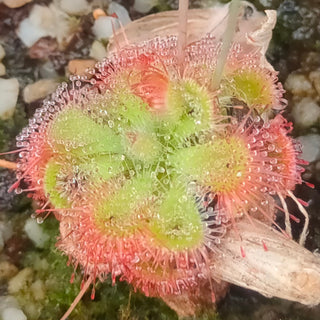Aralia spinosa
DEVIL'S WALKING STICK
- Unit price
- / per
Aralia spinosa, commonly known as devil's walking stick or Angelica tree, is native to eastern North America. It is cultivated for its exotic, tropical appearance, having large lacy compound leaves.
Aralia spinosa is widespread in the eastern United States, ranging from New York to Florida along the Atlantic coast, and westward to Ohio, Illinois, and Texas. It prefers a deep moist soil. The plants typically grow in the forest understory or at the edges of forests, often forming clonal thickets by sprouting from the roots.
Aralia spinosa is an aromatic spiny deciduous shrub or small tree growing 2-8 m (7-26 ft) tall. The trunks are up to 15-20 cm (6-8 in) in diameter, with the plants umbrella-like in habit with open crowns.
The flowers are creamy-white, individually small (about 5 mm or 3/16 in across) but produced in large composite panicles 30-60 cm (12-24 in) long; flowering is in the late summer. The fruit is a purplish-black berry 6-8 mm (1/4-5/16 in) in diameter, ripening in the fall.
The doubly or triply compound leaves are the largest of any temperate tree in the continental United States, often about a meter (three feet) long and 60 cm (two feet) wide. In the autumn the leaves turn to a peculiar bronze red touched with yellow which makes the tree conspicuous and attractive.
Limited supply.
Type: Hardy perennial
Hardiness zones: 5-9
Height: 3-5m, 10-15'
Location: Sun
Seeds per packet: 5
Sow just under the surface of the soil and water in. Leave them at room temperature for 6 weeks. This helps break the phytohormones which inhibit germination. They will not grow yet. Then a cooling period is required. Cover them with plastic and place in a fridge for 80 days. Be sure they stay moist. After the cold stratification period they are then brought back to a cool room (15-18C, 59-68F) for them to germinate. Germination can be erratic, generally 30-90 days after the warming period for most seeds, though some can take longer.
May be mildly toxic
Aralia spinosa
DEVIL'S WALKING STICK
- Unit price
- / per
Multiple secure payment options available.
Adding product to your cart
You may also like
Aralia spinosa, commonly known as devil's walking stick or Angelica tree, is native to eastern North America. It is cultivated for its exotic, tropical appearance, having large lacy compound leaves.
Aralia spinosa is widespread in the eastern United States, ranging from New York to Florida along the Atlantic coast, and westward to Ohio, Illinois, and Texas. It prefers a deep moist soil. The plants typically grow in the forest understory or at the edges of forests, often forming clonal thickets by sprouting from the roots.
Aralia spinosa is an aromatic spiny deciduous shrub or small tree growing 2-8 m (7-26 ft) tall. The trunks are up to 15-20 cm (6-8 in) in diameter, with the plants umbrella-like in habit with open crowns.
The flowers are creamy-white, individually small (about 5 mm or 3/16 in across) but produced in large composite panicles 30-60 cm (12-24 in) long; flowering is in the late summer. The fruit is a purplish-black berry 6-8 mm (1/4-5/16 in) in diameter, ripening in the fall.
The doubly or triply compound leaves are the largest of any temperate tree in the continental United States, often about a meter (three feet) long and 60 cm (two feet) wide. In the autumn the leaves turn to a peculiar bronze red touched with yellow which makes the tree conspicuous and attractive.
Limited supply.
Type: Hardy perennial
Hardiness zones: 5-9
Height: 3-5m, 10-15'
Location: Sun
Seeds per packet: 5
Sow just under the surface of the soil and water in. Leave them at room temperature for 6 weeks. This helps break the phytohormones which inhibit germination. They will not grow yet. Then a cooling period is required. Cover them with plastic and place in a fridge for 80 days. Be sure they stay moist. After the cold stratification period they are then brought back to a cool room (15-18C, 59-68F) for them to germinate. Germination can be erratic, generally 30-90 days after the warming period for most seeds, though some can take longer.
May be mildly toxic

















































